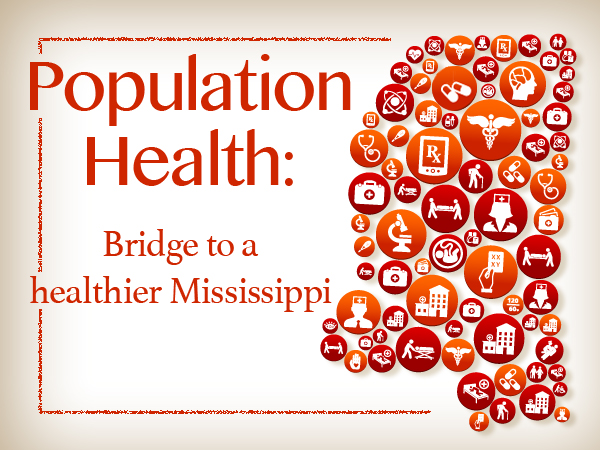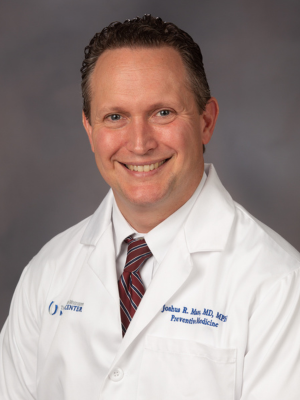UMMC to create new School of Population Health

Published in News Stories on April 21, 2016
The University of Mississippi Medical Center is advancing its mission to create a healthier Mississippi by forming the new University of Mississippi School of Population Health.
UMMC received permission to plan the school from the State Institutions of Higher Learning on April 21. Planned to open in 2017, it will be the third school of its kind in the United States, says Dr. Bettina Beech, associate vice chancellor for population health.

Beech
“Population health considers the whole continuum of factors that contribute to health outcomes,” Beech said. “In addition to biological factors, social, environmental and behavioral factors are all important determinants of health.”
This field of science focuses on how these factors interrelate and influence the distribution and determinants of disease and health in defined groups. It has a broader focus than public health, Beech says.
The mission of the school is to create leaders prepared to transform health care delivery and the health of Mississippians. These leaders will include population scientists, clinicians and administrators.
The school will begin with three departments: preventive medicine, data science and population health science. The first two are already in place within the School of Medicine and as part of the Center of Biostatistics and Bioinformatics, respectively.
Dr. Joshua Mann, professor and chair of the Department of Preventive Medicine, says that his department will be a bridge between the School of Medicine, the Medical Center's clinical enterprise and the School of Population Health.
The department will develop an accredited residency program in general preventive medicine.

“In preventive medicine, we have our feet in two worlds: patient care and population-level health,” Mann said.
Beech says that in the traditional health care delivery model, providers “take care of the patients at their doorstep” - those that visit clinics and hospitals for treatment. In population health and preventive medicine, Mann says, the emphasis is more on outpatient care and collaborations with communities and community groups to address the range of factors that influence health.
Population health has begun to transform health care by addressing the “triple aim”: improving patient outcomes and enhancing the patient experience while simultaneously reducing costs.
“With recent changes in health care funding, there is a greater emphasis on patient outcomes and not the volume of services provided,” Mann said.
The United States has the world's highest health expenditures, but the nation does not have the best health outcomes. Greater focus on disease prevention may tighten the gap, Beech says.
“UMMC is taking a proactive approach and leading the nation in preparing for 21st century health care,” Beech said. “We are developing a creative, innovative model to address health and health care.”
Dr. Michael Griswold, professor and director of the Center of Biostatistics and Bioinformatics, says that the new department will help prepare the next generation of health care providers transition to value-based care, population health precision medicine.
Data science bridges the disciplines of statistics, computer science and predictive analytics to turn large amounts of data into usable evidence.
The department will offer M.S. and Ph.D. degrees in biostatistics and data science.
“Our vision is to become a leading department of data science by providing cutting-edge expertise in research and education for translating data into evidence, answers and actions,” Griswold said.
“In population health, data is used to predict and prevent disease and to determine who is at risk,” Beech said. “This can provide a set of solutions to improve patient and community health outcomes.”
UMMC will conduct national searches for a Department of Population Health Science chair and faculty members. The department will offer research-oriented M.S. and Ph.D. degrees in population health. Eventually, the school intends to add a Department of Health Care Economics.

Didlake
Dr. Ralph Didlake, associate vice chancellor for academic affairs, said, “The delivery model of population health fits well with the needs of Mississippi and it is clear that this is the direction that we need to head as an institution.”
The school intends to hire faculty, recruit students and create coursework in 2016 and admit its first students in January 2017.
The School of Population Health will be located in the Translational Research Center, scheduled for completion in 2017. Basic, applied and population scientists sharing the same physical space will promote collaboration, Beech says. However, the school will not be confined to that space.

Construction of the new Translational Research Building.
“We are going to look beyond the borders of the Medical Center to conduct work that is pragmatic and applied to improve health outcomes throughout the state,” Beech said. “In fifteen to twenty years, we hope to see noticeable results in the community.”
The School of Population Health will be the seventh school on the UMMC campus. The others are medicine, nursing, dentistry, health related professions and graduate studies. The School of Pharmacy is located in Oxford with clinical programs at UMMC.
“To start a new school is a major undertaking and an exciting development,” said Dr. LouAnn Woodward, vice chancellor for health affairs and dean of the School of Medicine. “Population health and the concept of disease prevention are the future of health care and health-care delivery.”


